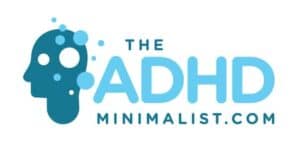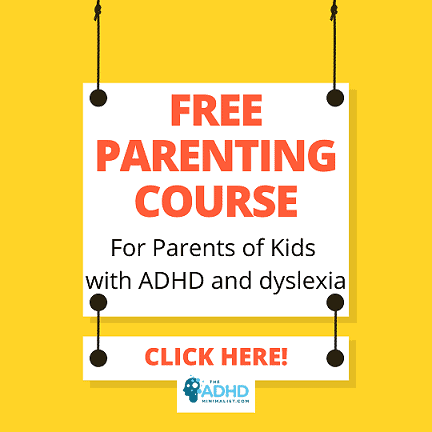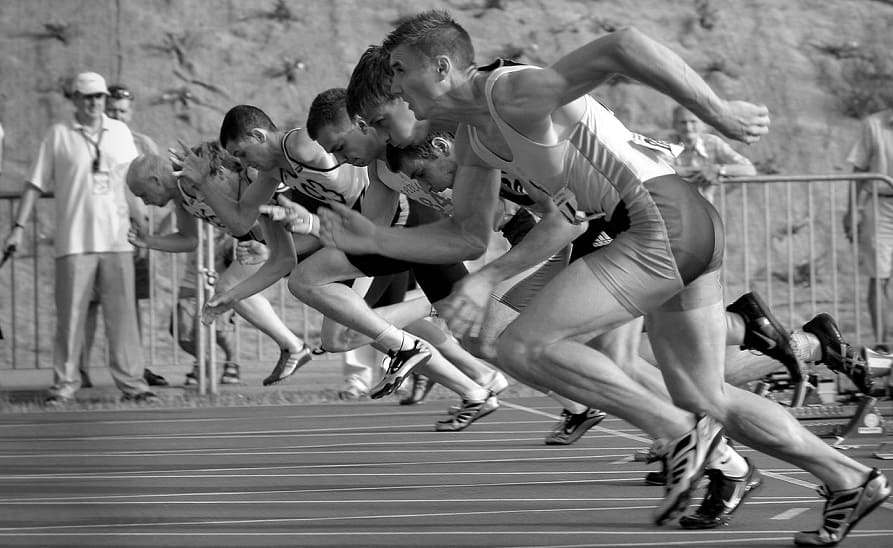
Physical activity is extremely beneficial for kids with ADHD.
When you engage in physical activity your brain’s levels of dopamine and norepinephrine are naturally raised. Many ADHD drugs try to copy this phenomenon. Often adults use sports or working out as a natural way to regulate their ADHD symptoms.
Even though it’s widely agreed that sports are good for ADHD kids finding a sport that suits your particular child [especially if they have ADHD predominantly inattentive (ADD)] can be a frustrating game of trial and error! My daughter has ADD and we tried several sports before we found one that suited her!
I am originally from the USA, but I moved to Sweden 16 years ago to learn Swedish when my husband and I were newly married (he is Swedish).
Three kids and a 200-year-old farmhouse later Sweden has become my home.
My children and I have Swedish Hockey players to thank for our dual citizenship. Hockey is a major sport in Sweden and many professional players wanted to play for the NHL but didn’t want to give up their Swedish citizenship. Eventually, this led to new laws that allowed dual citizenship.
I hope that compiling some of our experiences will save you time and frustration in your search for the right physical activity for your child!
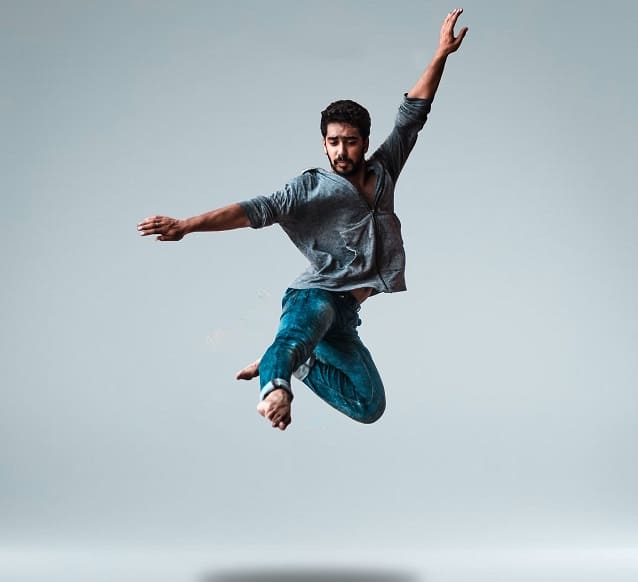
1) Dance
Although dance is not officially a sport, competitive dancing (Dancesport) was considered for inclusion in the 2020 Olympics (delayed to 2021 due to Covid-19).
Competitive dance is still not included in the Olympics, but dancing whether it’s on a dance team or with a ballet company requires you to be physically fit, learn moves (similar to karate or judo), be flexible, and practice just like any traditional sport.
The argument against dance being considered a sport is often that everyone can dance. While this is true some people dance much better than others and some forms of dance are impossible for the average Jane Doe to perform without extensive training.
I should know. I went to a performing arts school after high school and toured during the summer in Los Angeles with my class. We mainly performed hip hop, but we had a few ballerinas who added some spice to our performances.
During school, we were all forced to take ballet classes even though most of us would never master this type of dance. Our trainers said it helped build core muscles and improve balance. I know from experience not everyone can do every dance!
I am including dance in my list of sports for Kids with ADHD predominantly inattentive because I think competitive dancing deserves sports status.
Some of the most popular types of dance include:

- Ballet
- Ballroom
- Contemporary
- Hip Hop
- Jazz
- Tap Dance
- Folk Dance
- Irish Dance
Dance is often a girl-dominated sport, but it can be just as fun for boys to take a dance class.
Boys often have the advantage of having few other males to compete against within a dance team and may receive special roles in performances early in their dance career simply because the world needs more male dancers.
You may think that dance could be a poor activity for ADHD kids because there are a lot of moves to remember, but often after many practices the moves become automatic and there is no need to think about each movement.
When learning a new dance ADHD and non-ADHD kids are all in the same boat they start at the beginning and repeat the moves until they work out all their mistakes.
If your ADHD child feels like the rest of the class is catching on before they do encourage them to practice at home. Often kids think dance is so much fun that it’s not a burden to practice, but they may need you to remind them to practice.
If your ADD child is anything like mine there are a lot of good intentions, but she forgets to do things even though they are important to her. (My daughter forgets to practice her violin at home even though she wants to.)
She is now old enough to recognize her forgetfulness and ask for help.
Your child may need a mirror and some space to practice. If you can sort out a place to practice at home where he/she can play loud music and jump around without knocking things over this would be ideal.
Famous Professional Dancers with ADHD
Karina Smirnoff is a professional dancer well known for her role in ‘’Dancing with the stars’’ She is a well-decorated dancer winning the U.S. National Championships five times as well as being World Trophy Champion.
In an interview with The Saturday Evening Post, Smirnoff admitted. “As a professional dancer, I’ve become known for my moves and my career accomplishments, but most people don’t know about another part of my life — I’m an adult with ADHD,”
The Benefits of Dance for ADHD kids
- Dance can improve memory
- Help your child work on social skills
- It gets rid of excess energy
- It is a good mix of ritualistic activity and high energy fun.
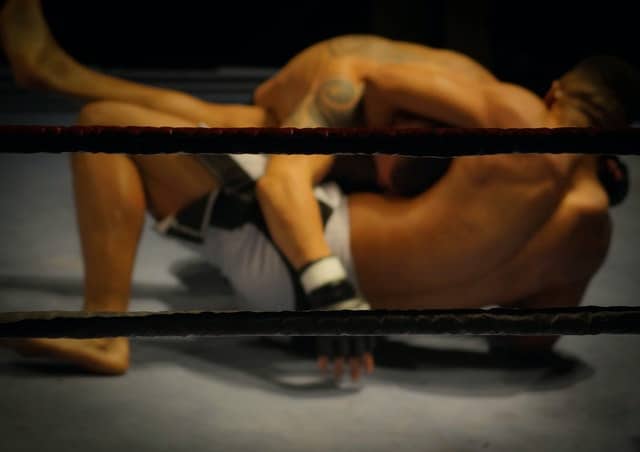
2) Wrestling
Wrestling is one of the oldest sports in the world it’s origins can be traced back 15,000 years through drawings on cave walls.
Wrestling encompasses a wide range of styles:
There are several more wrestling styles and many of them can be beneficial to ADHD kids, but in this article, I am discussing the traditional wrestling that many kids in the USA learn and compete in through school sports programs.
Most European cities have a wrestling program for children. In Scandinavia, it costs an average of 30$ (300kr) per semester to sign your kids up for wrestling. Often it’s a fee from a local club (you need to be a member to participate) and the actual wrestling is free.
If you can’t get your child signed up for a free school program you can check at your local YMCA. Many cities in the USA have wrestling programs. Often the fees in the USA are considerably higher than in Scandinavia. If money is tight try free sports options first.
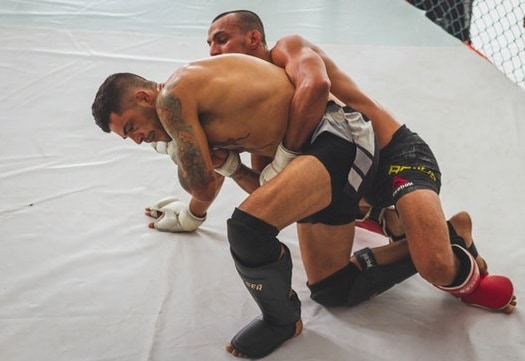
The appeal of wrestling is that you’re on a team, but it’s an individual sport. Children get the social benefits of training with peers, but when it’s match time it’s all about the individual.
Kids with ADHD often lack social skills and tend to impulsively poke, nudge, or touch their peers in ways that may be disconcerting. Wrestling can be a way to harness this impulsivity.
Wrestling can help kids who impulsively touch others. Often ADHD kids don’t mean anything by their odd behaviors they just can’t resist their impulses. The idea is that learning wrestling moves and strategies can help these children control themselves.
At the very least wrestling provides a way for ADHD kids to touch in a socially acceptable way which should alleviate some of their impulsive urges to poke, prod, or push others during class or in the school halls.
The impulse to touch others may seem like a symptom of ADHD predominantly hyper, but my daughter who has ADHD predominantly inattentive struggles with the impulse to hit or push others when she is angry. A non ADD child may push once or twice out of anger, but my daughter can’t seem to stop!
Wrestling is unique because it has a low threshold for beginners. Everyone can be a wrestler. It doesn’t matter what you weigh or what body shape you have. There are weight classes for everyone.
Wrestling does require some skill, but much of who wins a match is determined by sheer determination, toughness, and the desire to win.
Thus kids new to the sport can take some early wins which stimulate the reward center of the brain and raises dopamine levels.
Dopamine is usually low in ADHD kids, so this rise in dopamine can be extremely motivating. It may be the reason why many ADHD kids thrive in wrestling.
‘’The regions of the brain comprising the “reward system” use the neurotransmitter dopamine to communicate. Dopamine-producing neurons in the ventral tegmental area (VTA) communicate with neurons in the nucleus accumbens in order to evaluate rewards and motivate us to obtain them’’ writes Deborah Halber
(Picture compliments of Brain Facts.org)
Famous wrestlers with ADHD
Richie Frieman
‘’Each time “The Thrill From Israel” Buster Maccabi stepped onto the mat, he wasn’t just wrestling his opponent — he was also confronting his ADHD. A regular on the independent pro-wrestling circuit from 2000 to 2008, Richie Frieman (his real name off the mat) earned more than a dozen titles.
And now the 5-foot-5, 155-pound 41-year-old attributes his pro-wrestling success to his ability to channel his ADHD’’ writes Everyday Health.
The Benefits of Wrestling for ADHD kids
- Wrestling is thought to increase children’s confidence
- Build self-esteem
- Help control impulses
- Teach discipline.
These are all attributes that ADHD kids often lack making wrestling a fit for both ADHD predominantly Hyper and ADHD predominantly inattentive in more ways than one!
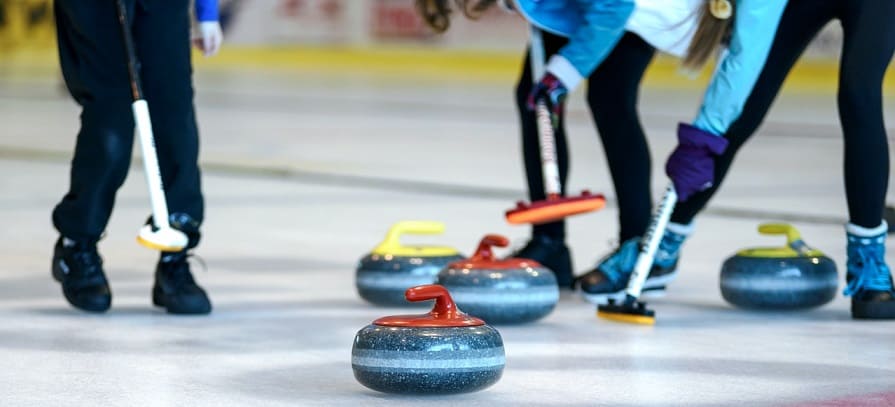
3) Curling
Curling may seem like an old people’s sport, but the men and women who compete in the world champions or the Olympics had to start somewhere.
Most major cities have a children’s curling club.
Most curling teams consist of 4 players:
- The Lead
- The Second
- The Third or Vice-Skip
- The Skip
Some types of curling have 2 player teams.
The Skip is considered the most important player. Usually, the team decides collectively where to place their curling stones, but the Skip directs the overall strategy.
The strategy of curling is something that kids learn over time. Game strategy can be a great exercise for the ADHD predominantly inattentive kid’s brains.
Curling consists of fast movements for the sweepers and slower concise movements for the teammate delivering the stone.
Teammates take turns delivering the stone and sweeping. The one exception is the Skip. The Lead, the Second, and the Vice-Skip alternate delivering the stone and sweeping.
For example, If the Lead is delivering the stone then the Second and the Vice-Skip are sweeping.
There is enough movement in curling to help ADD kids get their wiggles out, and the strategy of the game can improve their executive functioning skills.
Kids do have to wait while the other team takes their turn, but I find that waiting isn’t a huge problem for kids with ADD especially if they have their opponents play to watch.
This is a game better suited for kids with ADHD predominantly inattentive. Kids with ADHD predominantly hyper would probably find that there is too much waiting time when the opposite team makes their moves.
We live in Sweden where curling is more popular than in the USA, but in other northern countries like Norway, Finland, Denmark, and Canada most people have a basic understanding of curling, and smaller cities are more likely to have a curling hall.

Famous Women in Curling
Auria Moore and Porsche Stephenson started curling after an injury that required a calmer sport as a form of physical therapy. This team of friends is experiencing extreme success in curling competitions. They found that it didn’t take long to begin winning competitions which may be just what ADHD kids need to motivate them.
(Source) https://www.essence.com/in-her-we-trust/curlers-auria-moore-porsche-stephenson/
The Benefits of Curling for ADHD kids
- It improves executive functioning skills
- It’s social
- kids learn to take turns
- Children learn to work as a team
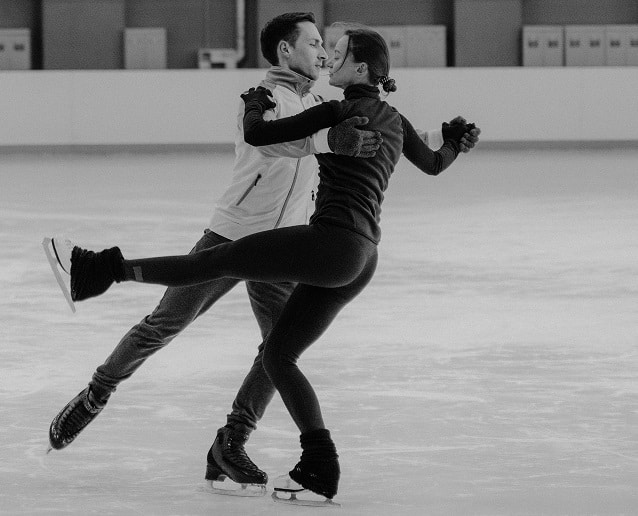
4) Ice skating and figure skating
I always wanted to take figure skating lessons when I was a kid. I think that lots of kids watch the Olympics and wish they could fly through the air on ice skates!
Training to compete in ice skating is not possible in all locations. I lived at least an hour from the nearest indoor ice skating arena during my growing up years.
It didn’t get cold enough to ice skate outside in the USA’s midwest where I grew up. Temperatures often fluctuated between plus and minus all winter. There weren’t many who dared venture out on the ice when we had a freeze; News reports of people drowning when trying to ice fish scared people off and this was probably a good thing.
I never got my ice skating lessons, but for those of you who do live near an indoor ice skating arena that has an ice skating program, you may consider signing your child up for lessons.
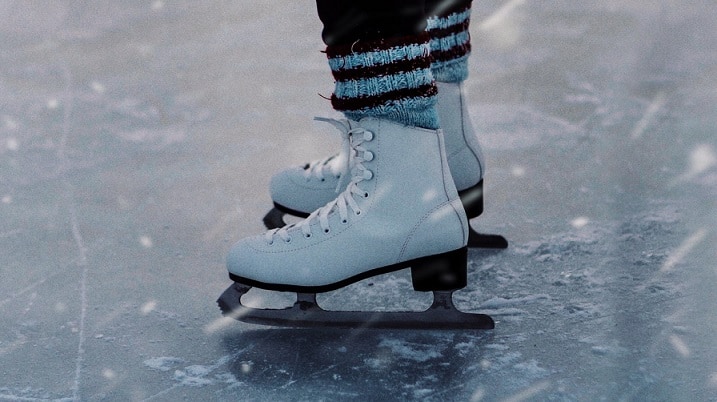
Different kinds of ice skating include:
- Figure skating.
- Men’s singles
- Ladies’ singles
- Pair skating
- Ice dance
- Synchronized skating
- Short-track speed skating.
- Long-track speed skating.
We now live in Sweden and it’s possible to ice skate in the winter, but we don’t live close enough to an arena with a figure skating program for lessons.
If you live in a cold climate you can run water outside to make ice. We did this several years when my kids were younger. We turned on the garden hose and turned our yard into an ice skating rink!
Don’t worry the ice didn’t hurt our lawn.
This was a fun after-school activity we did at home. My kids would come home, get a snack, and put on their skates. Often we just skated around in circles, but when family and friends came over we played an occasional game of Hockey.
My youngest is nearly five years younger than her closest sibling. Her brother and sister who are respectively seven and five years older often took turns pushing her around the ice in her infant car seat (Under my supervision of course) She loved this!
Famous Ice Skaters with ADHD
Zach Donohue Ice Dancer
Zach’s mother Dee Eggert believes that Zach’s love of Skating may stem from his ADHD. He struggled with ADHD as a child and Ice Skating built his self-confidence.
Madison Hubbell is Zach’s partner on the ice and the pair took the world by storm at the 2018 U.S. National Championships.
“The main reason we got him involved in skating—it was something that he loved,” Eggert told WNPR. “It was something that he was good at, and he really wasn’t good at competitive team sports.”
Gabrielle Daleman
Gabrielle is an Olympic Figure Skater who was often bullied as a child. She couldn’t read and write properly. Despite a normal IQ, her Learning disability caused her to struggle with homework and friends, as well as everyday things like enjoying a good book.
If you decide to make an ice skating rink at home you will need to. . .
- Have a natural depression in your yard close enough to the house to be reached by a garden hose.
- And/or build a frame with 2×4’s. This allows you to use less water.
- Make sure you keep water away from your house.
- If you don’t have your own well you may want to check what using extra water costs at your local utility company.
- Shovel the snow off of the ice directly after each snow.
- If the ice becomes bumpy you can pump more water on the rink and let it freeze over the uneven layer.
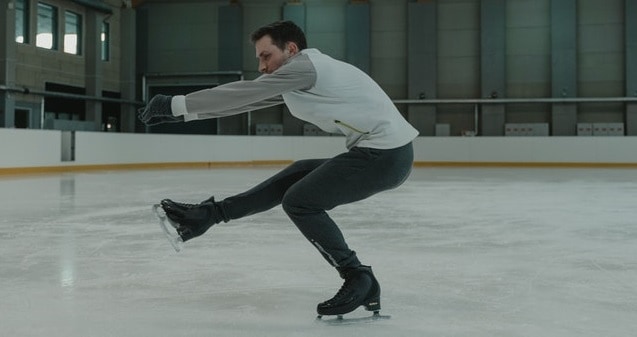
The Benefits of Ice skating for ADHD kids
- Exercise improves cognitive functioning.
- There are many kinds of ice skating most kids will find one that suits them despite what combination of ADHD they have.
- Ice skating improves coordination. Doctors agree that often ADHD kids lack coordination, are considered clumsy or are often dropping things.
- Burns excess energy
- Ice Skating can be very social or very individualistic depending on which type you choose. Some ADHD kids (like my son) can’t handle too much social activity. My daughter on the other hand needs much more social interaction. She has ADHD predominantly inattentive.
- Learning to ice skate is great for coordination, something that many ADHD kids have trouble with.
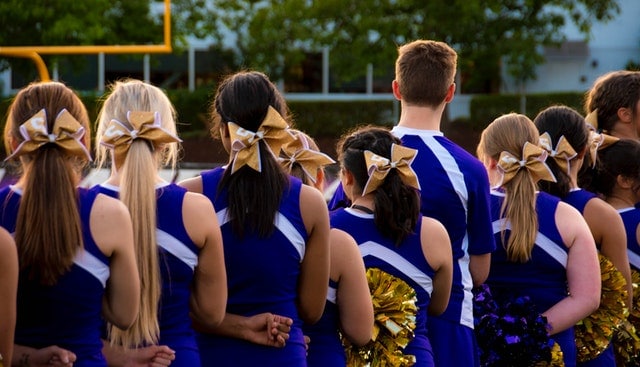
5) Cheerleading
Even Though cheerleading isn’t recognized by the NCAA as a sport I think it should be considered a sport.
Kids who have ADD are not as hyper as kids with ADHD, and Cheerleading may be better suited for children with ADHD (ADHD predominantly inattentive)
We have no cheerleaders at my children’s school because in Sweden there are no sports in school, but I think my daughter (ADD) would make a good cheerleader.
I grew up in America, and I know that most cheerleaders take cheerleading seriously and work hard. Many cheerleading stunts require athletic abilities similar to certain types of gymnastics. There are many competitions for cheerleading, and college scholarships for cheerleaders are becoming more common.
TV doesn’t always give the best picture of what cheerleading is.
My daughter is very athletic. She would enjoy building pyramids and throwing teammates in the air.
Most cheerleading cheers are high-energy and cheering intermittently throughout the game helps concentration and keep the wiggles and fidgets at bay.
My daughter may have a fit if she had to wear a cheerleading outfit because she is a tomboy, but I don’t think she would have any trouble standing on the sidelines and keeping still when there was an entertaining game to watch.
Kids with ADD probably won’t make the best team captains, but most ADD kids don’t want that kind of responsibility. The pressure that comes with being a team leader doesn’t appeal to my daughter.
She is often glad to just be part of the team and let others take the responsibility and the glory that comes with being a team captain.

I found some articles about how Cheerleading helps ADHD/ADD girls.
The quote below I found inspiring!
‘’We were afraid of her driving her coaches to the point of either killing her or themselves (I am only half-kidding on that). What was wonderful about all-star cheerleading for our daughter? Activity and variety! There was tumbling, there was dance, there was stunting, there were others to talk to and have fun with. . . She LOVED it! She was not a shy child by any means, so it all seemed to be a natural fit. Yeah, but it wasn’t all wine and roses. . . Reality then hit. . . Learning choreography and doing drills and conditioning. Those were her downfalls.’’ writes Pam co-founder of The Heart of Cheer.
She goes on to explain that her daughter could run out of practice crying if she was corrected, and had an especially hard time with cheerleading when she had a bad day at school.
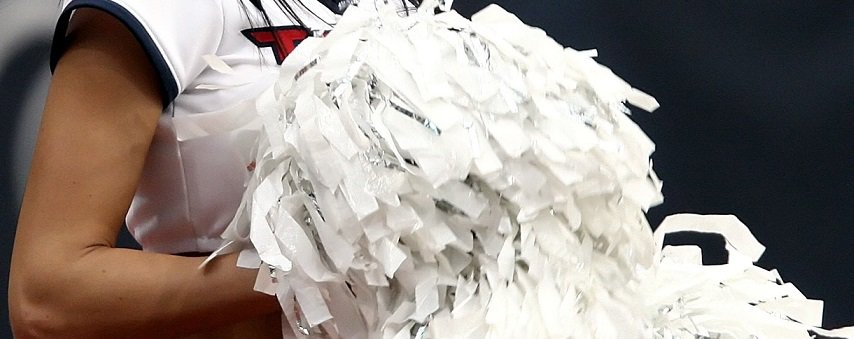
Pam had two great tips.
- Keep in close contact with your ADHD child’s coach no matter what sport they participate in. Some days she needed to call the coach and warn her that school had been rough.
- Front-load your ADHD child’s day! Pam explains that she talked through everything that would happen that day with her daughter at breakfast. This helped, but taking frontloading to the next level is what really helped her daughter. On the days her daughter had practice after school she wore her sports clothes to school. The clothes were a constant reminder that she had practice later and made transitions easier.
The Benefits of Cheerleading for ADHD kids
- Help improve concentration
- High energy cheers help get rid of extra energy
- Lets kids practice waiting
- Teaches kids to be a team player (often the team captain starts the next cheer and the other just follows her lead. This often appeals to ADD kids.)
- It’s social

6) Running cross country
I am not very good at long-distance running, but my husband is and I think my daughter could be if there was a program that we could sign her up for in Sweden.
Some schools in the USA have cross country teams where the team gets points for each individual’s performance. This is a great way to be on a team, even though it’s your individual performance that gives the team points.
Often these teams train together running short and long distances during practices.
These kinds of teams are great for ADHD kids. Being on a team promotes social skills which ADHD kids often need to work on, and comradery something ADHD kids, who are often made fun of and isolated, crave.
You would think that cross-country would be most beneficial for ADHD predominantly hyper, but my son who has such a diagnosis wouldn’t be able to handle the monotony of cross-country running.
My daughter who has ADD can do things like running, cycling, or other monotonous sports for longer periods. If you make it a competition. She’ll keep at it even longer. She loves to win!
Famous Long Distance Runners with ADHD
Most of the runners I read about had ADHD predominately Hyper, but my daughter (ADD) enjoys trail running together with her father.
Gina Lucrezi is a professional trail runner and the founder of trail sisters.
‘’By the end of high school, I had set multiple school records in track and x-c, my field hockey team had a winning record, and my varsity jacket was so full of victory patches and shiny do-dads that I was colorful enough to march in the Mummers Day Parade. Thanks to my ADHD, I was crushing it at athletics.’’ writes Gina Lucrezi.
The Benefits of Cross-Country running for ADHD kids
- It’s a good environment to work on social skills
- ADHD kids are accepted into a team
- There isn’t much energy left for fidgeting or other ADHD behaviors when you’re running or directly after a run.
- Running is a skill that you can use to stay in shape your whole life. Those who learn to love running early are more likely to continue running as an adult habit.

7) Track and field
I ran track and tried high jumping, shot put, and long jump in junior high. I can’t say that I was particularly good at any of these events, but it was fun.
Practicing with teammates helped me push myself. I wasn’t very good at that when I practiced at home.
Track gave me the feeling of being on a team, but it felt much more relaxed than playing basketball or volleyball (both of which I played in junior high and high school).
The only actual ‘Team’ sport I did in Track was running a relay. This was usually my favorite event.
Although I have no formal diagnosis, after reading numerous books on the subject, I believe I have ADHD. That would explain some of my childhood problems in school among other things. If you would like to read more about my school years in America you can read my post What every teacher should know about the ADHD child
I have fond memories of Track Meets, and Track would be one of the first sports I would sign my daughter up for if we ever moved back to the States. I think that track would suit her personality. Despite her ADD, she is very athletic and competitive.
Famous athletes with ADHD
Michelle Carter, is the first American woman to win a gold Olympic medal for Shot Put. She was diagnosed with ADHD and dyslexia early in childhood. She tried taking medication but didn’t find it helpful.
Her excellence in Trach & Field earned her a full scholarship to the University of Texas.
On top of all her sports accomplishments, Michelle found time to launch her line of makeup and started a camp for female athletes who struggle with body image.
“What I would tell a kid who struggles with anything in life is this: When you put your mind to it, you can do anything,” writes Carter on her blog. “It may not be easy, but you can do it. It may take a long time, but you can do it. Learning disabilities do not go away — you learn how to adapt… Find out how you learn, work with it, and work it out!”
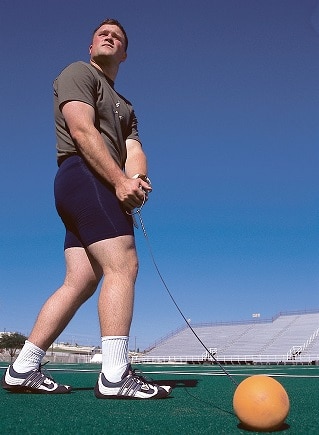
The Benefits of Track and Field for ADHD kids
- There are many events in a track meet. Grade schoolers and Jr high kids are often encouraged to try all the different events to find a few that suit them. Trying many things is often a good fit for ADHD/ADD kids.
- Kids can concentrate on their events and relax in between. They don’t need to sustain concentration for long periods of time.
- It’s social you get the benefits of being part of a team.
- In track and field, there is usually an event that is well suited to every child.
- Kids who make 1st, 2nd, or 3rd place get a metal, an adrenaline rush, and the release of dopamine to the brain. This feel-good reward encourages them to win again! ADHD kids often have dopamine levels that are too low.
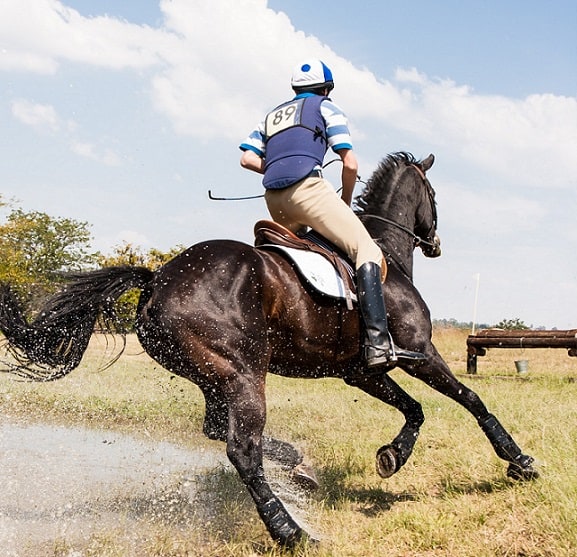
8) Horseback riding
I signed my daughter up for horseback riding several years ago, but she never actually started training.
The Stable nearest our house took the application forms and then made groups of children determined by what age and what level they were at. This meant that I didn’t know what day of the week the training was on until after we signed up.
I ended up thanking them and giving my daughter’s spot to someone else because horseback riding ended up on the same day as her judo class.
She loved Judo and didn’t want to quit.
My daughter likes animals but doesn’t have this innate love of horses that many girls her age do. In the end, Judo was a much better choice for her, but I believe that many children with ADHD predominantly inattentive will thrive around horses.
Our neighbors have horses, so my kids do ride horses from time to time.
Many ADD/ADHD kids find it relaxing to be with horses. This is probably why horse therapy has become so common.
Horseback riding can help with ADHD/ADD complications like constipation and low tone.
According to Web Med, 4.1 percent of the children with ADHD suffer from constipation. Among children who do not have a diagnosis only 1.5 percent are constipated.
My kids have trouble with constipation and I was greatly helped by a book that a fellow blogger wrote, ‘’What your dr didn’t tell you about constipation’’ by Wendy Hayden.
Her book is full of wonderful advice and ideas for helping constipated kids!
Get the book here What Your Doctor Didn’t Tell You About Childhood Constipation
Audiobook here What Your Doctor Didn’t Tell You About Childhood Constipation Audiobook
She suggests signing up your child for horseback riding to strengthen core muscles which when strengthened help alleviate constipation.
To get her cookbook full of recipes for constipated kids click here. Constipation Relief and Gut Healing Cookbook

One thing to ask about when choosing a ranch or stable to begin riding lessons at is how much support is required from the parents?
Some riding clubs require that parents work a certain number of weekends per year taking care of the horses for their children to attend lessons. These clubs usually have a cheaper entrance fee.
On the other hand, you can always find a ranch or stable with a higher fee that doesn’t require any work from the parents.
Where we live parents are required to accompany their kids to lessons about basic horse safety and horse care before their child can begin riding lessons. This is approximately 10 lessons that a parent needs to be present at.
If your child has extreme problems accompanying their ADHD you may want to look for a ranch that does equestrian therapy for special needs kids.
Some of these stables geared towards horse therapy may even have a riding group for ADHD kids. If you have a ranch or riding club for special needs kids near you check it out first. Those who work regularly with special needs kids will have a wonderful understanding of you and your child!

A 2011 study found that Therapeutic Horseback Riding was beneficial for ADHD
The Effect of Therapeutic Horseback Riding on 5 Children with Attention Deficit Hyperactivity Disorder: A Pilot Study
- Source PubMed
- Authors: Koenraad Cuyper, Karin A De Ridder, Arve Strandheim
‘’The results of the present study indicate that therapeutic horseback riding had a positive effect on 5 children with ADHD in several domains of the social role behavior, quality of life, and motor performance. This pilot study constitutes a good scientific prospect for future studies.’’
The Benefits of Horseback Riding for ADHD kids.
- Horses have a calming effect
- Horseback riding helps strengthen core muscles and can help alleviate complications of ADHD like Low Tone and constipation. Get Wendy Hayden’s audiobook here What Your Doctor Didn’t Tell You About Childhood Constipation Audiobook
- Kids learn to take care of horses and take responsibility
- ADHD kids learn that they can not do whatever they want while on horseback! They have to control their impulses or they will scare the horse!
- According to the study riding horses, kids know appropriate social behavior
- The study indicates that horseback riding improved the quality of life for ADHD kids
- Riding horses improves motor skills
(Source) https://www.webmd.com/add-adhd/childhood-adhd/news/20131021/kids-with-adhd-often-prone-to-bowel-problems-study#1

9) Karate
There is plenty of research about Karate (as well as other martial arts) and ADHD. The consensus is that Karate can reduce ADHD symptoms!
Dr. Ramfis L. Márquez-Castillo found that martial arts can improve children’s academic endeavors and reduce some ADHD symptoms!
Karate is a sport that focuses on the individual, but it gives ADHD kids a good social environment.
Often kids with ADHD need to work on social skills.
This may be because kids with ADHD are often impulsive and disregard social norms or because they are different and hard to be around which leads to social ostracization.
Karate fosters an environment of respect and acceptance. East Asia is where Karate originally evolved. It became an established martial art in Okinawa during the 17centry and was imported to Japan in the 1920s. Not all schools of karate teach the same methods.
In Japan as well as other parts of Asia, respect is highly valued. There are some valuable lessons kids can learn from Karate. Respect for one’s elders, respect for peers, persistently working towards one’s goals, and social skills, just to name a few.
Karate instructors do a good job of breaking down difficult moves into smaller bite-sized pieces. Kids learn gradually often learning a bit of a technique at a time and adding another step when they have mastered the art they already know.
Eventually, all of these small steps turn into fluid movements.
My son tried karate and liked it. He has ADHD predominately Hyper, but I believe that Karate can work equally well for kids with ADHD predominately inattentive.
Unfortunately, his karate lessons have been put on hold due to corona. I am hopeful that many activities will resume in the spring of 2021.
Karate provides ADHD kids with structure, it helps kids learn to concentrate and self-regulate.
If you have an older student who would like to begin karate, ask if your local studio can spend some one-on-one time with your child. My son greatly benefited from being instructed on-on-one. When your child gets the hang of the basics they can join the group.
Younger child and jump right into group training unless they have a special reason for needing one-on-one instruction. For example, if they are extremely impulsive, incredibly shy, or scared of new situations and people.
Most trainers are extremely helpful.
Karate lessons usually cost but are not overly expensive.

The Benefits of Karate for ADHD Kids
- Karate provides a positive social environment
- Kids learn respect for one’s elders
- They learn to respect themselves
- Karate teaches setting goals and diligently working towards them. Kids learn persistence.
- Kids learn self-defense which can be especially beneficial for ADD girls if they find themselves in a situation that seems threatening
(Source) https://search.proquest.com/openview/b5360412b2eeddfe96e934fbadc1d807/1?pq-origsite=gscholar&cbl=18750&diss=y

10) Judo
This is my daughter’s favorite sport.
Judo is highly recommended for ADHD kids because it’s ritualistic.
“Rituals are good for ADHD kids because they make behavior automatic. For most of us, daily actions such as remembering to take your medicine are automatic. But without rituals such as ‘every time I brush my teeth I take my medicine,’ people with ADHD don’t remember.” explains Patricia Quinn, a developmental pediatrician who specializes in ADHD at the Pediatric Development Center.
We originally entered my daughter in Judo because she needed an activity that was separate from her brother’s activities.
Judo was convenient because we have a local Judo club and several of her friends were joining.
Her brother has ADHD predominantly hyper and when he was younger he could be overbearing at times and tell his sister everything she was doing wrong or monopolize my husband’s and my time, so we didn’t get to spend enough time with our girls.
My daughter has ADHD predominantly inattentive. She needed to spend some time away from her brother and Judo happened to be a great solution. She liked it immediately and was rather good at it. She enjoyed it so much that she rejected a chance at horseback riding lessons because she didn’t want to quit judo!
In Judo complicated moves are broken down into smaller segments and when children master a segment they get to add a new segment.
Breaking the complicated into simple segments allows anyone to learn it, and the ritualistic nature of doing the same move over and over again eventually commits it to muscle memory.
When children can commit things to muscle memory they can do complicated Judo moves without thinking.
When in a match they might automatically react to an opponent because their brain knows that when their opponent makes a certain move their muscles should react in a particular way.
It’s thought that when sports are ritualistic it helps ADHD kids calm down because they know what to expect.
Famous Judo Masters with ADHD
Ashley McKenzie
He told Mirror ‘ADHD wrecked my life until I discovered judo’
‘’Britain’s number one judo champion Ashley McKenzie, 25, competed at London 2012 for Team GB and won gold at the Commonwealth Games. This is all the more staggering because he has fought to control his attention deficit hyperactivity disorder since childhood.’’ Quote from Mirror.
The Benefits of Judo for ADHD Kids
- Kids learn how to incorporate rituals into their lives. ADHD makes it hard for kids to remember everyday things and making rituals (or habits) out of things they have to remember makes life easier.
- All forms of martial arts teach kids respect for their elders
- Kids learn respect for themselves.
- They learn self-defense which can be especially beneficial for ADD girls. It can be good to have some moves committed to muscle memory if they are ever in a situation where they feel physically threatened.
- My daughter gained tons of self-confidence from Judo.

11) Gymnastics
Two of my kids (who both have ADHD) took gymnastics when they were small, and they both enjoyed it.
There are many different kinds of gymnastics.
The following disciplines are governed by the Federation of International Gymnastics.
- Artistic gymnastics
- Rhythmic gymnastics
- Trampolining
- Tumbling
- Acrobatic gymnastics
- Aerobic gymnastics
- Parkour
- Aesthetic group gymnastics
There is a lot to choose from under the umbrella of gymnastics.
My kids took gymnastics geared towards small children. They tried many forms of gymnastics and the point was to become more flexible and have fun.
This type of gymnastics can be fun for ADHD (ADD) kids. Often the training was in the form of an obstacle course with trainers standing in different spots to help kids do a cartwheel correctly or balance on the balance beam.
On the obstacle course, many kids could go through it at the same time. This cut down on wait times and my kids didn’t get bored or rowdy very often.
Often if my daughter got out of line there was a friend involved.
Trainers are usually quick to see if two kids can’t wait quietly beside each other and they make adjustments.
This type of gymnastics is often for younger children. If your child doesn’t have a certain type of gymnastics they are passionate about when they are ready to graduate into a stricter, more specific class, then parkour may be a good option.
Both my son who has ADHD predominantly Hyper and my daughter who has ADHD predominantly inattentive enjoyed this form of gymnastics.
However, I don’t think my son would enjoy more specific, higher-level gymnastics. He has too much trouble waiting on teammates and sitting still to listen to instructions.
My daughter on the other hand would probably enjoy several forms of more advanced gymnastics. She isn’t hyper like her brother and doesn’t have as much aversion to sitting still or waiting in her turn.
Famous Gymnasts with ADHD
Simone Biles, an Olympic gymnast, opened up about her ADHD when Russian hackers broke into the World Anti-Doping Agency database and exposed her use of ADHD medication.
She submitted a request to continue taking Ritalin for her ADHD during competitions and was approved, so her medals are not in jeopardy.
Dr. Jennifer Ashton doesn’t believe ADHD meds can give you an unfair advantage. She hopes as more athletes open up about ADHD people will get a better understanding of what ADHD is and that just like any other medical condition it needs medication. You can read the article on Simone Biles in ADDitude Magazine.
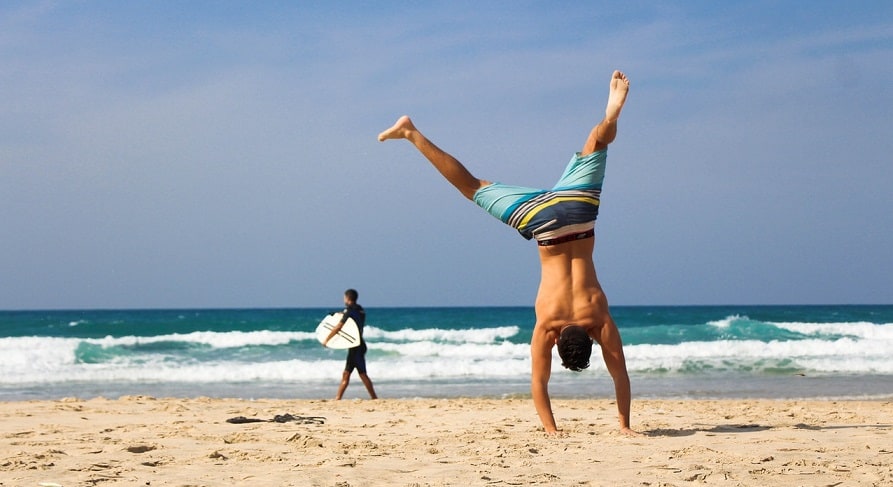
The Benefits of Gymnastics for ADHD Kids
- It’s a social environment
- You’re on a team, but in most forms of gymnastics, it’s up to you as an individual to do your event and bring points to the team. This type of team sport is often a better option for ADHD kids.
- Kids can burn extra energy
- In higher levels of gymnastics, kids often get individual attention from their coach
- Kids become more flexible, something that will help ADHD/ADD kids who often climb, jump, and do stunts not to hurt themselves in general.
- Gymnastics strengthen core muscles which can help alleviate side effects of ADHD/ADD-like low tone and constipation. To get Wendy Hayden’s book click here What Your Doctor Didn’t Tell You About Childhood Constipation Audiobook
If you want to read more about low tone or how to help your child with constipation Wendy Hayden wrote a wonderful book after helping her son overcome these problems. She has great tips that I used with my daughters and they actually work!!! _____________
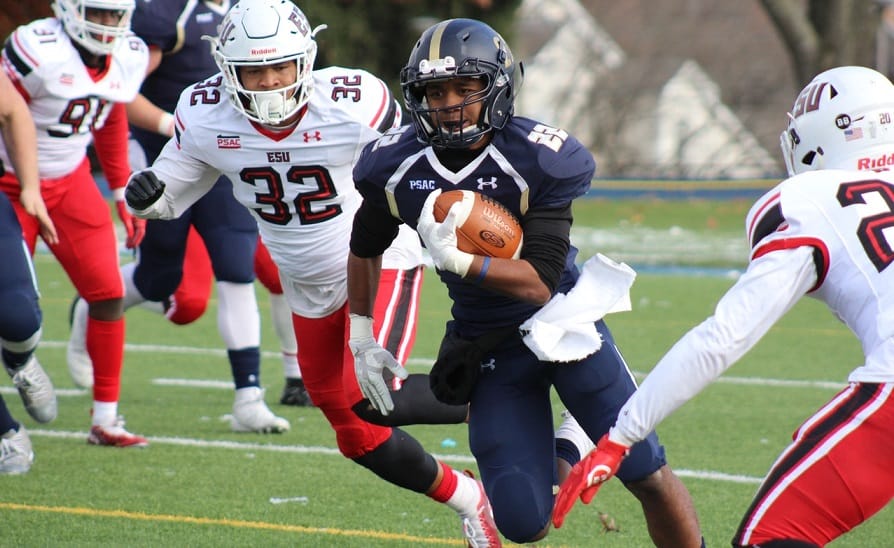
12) American Football
This is a team sport with a lot of downtimes. If your child is on a special team that is only occasionally required the downtime can be considerable. Nevertheless, I believe that Football can be a good fit for some ADHD kids, but of course not all.
Kids who have a talent for aspects of this sport or express a desire to play Football should try it.
My son who has ADHD wanted to try American Football. I think he wants to connect with his American roots, but since we live in Sweden the nearest team was too far away he couldn’t participate.

Football can be a good way to let out some of the aggression and anger that many ADHD kids have. Blocking and knocking each other around on the field is a socially acceptable way to let it all out!
If your child wants to try American Football the coach is key!
If your child is only occasionally in the game. He probably needs a coach or volunteer to keep him warmed up on the sidelines and keep an eye on him.
It may be possible to listen to a recording of his coach talking through his particular part in the game so he stays focused during downtime. Possibly listening to music in headphones could be helpful while jumping around and staying warmed up, or snacking while sitting on the bench.
Kids with ADHD Predominantly inattentive may thrive in American Football because they only need to pay attention to their part in the game.
If they know what is required of them when they are on the field the challenge is keeping them on the bench for extended periods.
I believe this can be managed. If your child has ADD they may be able to sit on the bench and squirm for a while if they have an adult letting them know when it’s time to get and warm up before they go out on the field.
Famous American Football players with ADHD
Terry Bradshaw
The former star quarterback for the Pittsburgh Steelers Terry Bradshaw made the Football Hall of Fame despite struggling with ADHD.
He helped his team win the Super Bowl four times!
In his memoir, It’s Only a Game, he describes how he put up with lots of teasing, even in college. His ADD made reading especially challenging, and the ability to read properly or not affects all the subjects in school! Consequently, he got poor grades.
He didn’t let the teasing geet him down. Instead, he worked even harder at football!
Who knows it may have been to prove to those teasing idiots that he was good at something that made him push himself to be the best he could be, and he succeeded!
The Benefits of American Football for ADHD kids.
- ADHD kids get to be part of a team and that helps them make friends.
- They practice social skills.
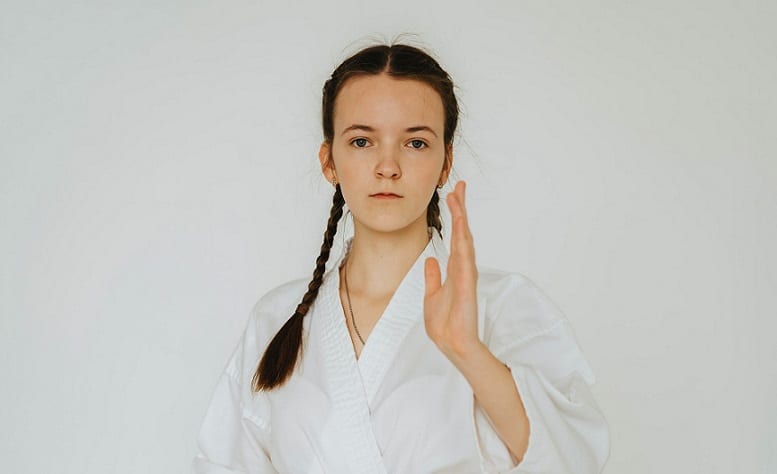
13) Taekwondo (Tae Kwondo)
Although the name Taekwondo has only been in use since 1955 It’s one of the oldest martial arts. It originated in Korea in 2333 B.C. directly translated Taekwondo means “the way of the foot and fist”.
I had a friend in high school who burned off excess energy training Taekwondo by his senior year he reached blackbelt status.
ADHD was not often diagnosed when I was in school but looking back It’s obvious to me that several of my friends and classmates had undiagnosed ADHD probably myself included.
Often finding a sport that suited them helped my classmates manage their symptoms.
A study published in the International Journal of Environmental Research and Public Health, on how Taekwondo affects ADHD kids concluded,‘’TKD could be considered as an appropriate non-pharmacological therapeutic method to combat/counteract the attentional impairment of individuals with ADHD from a younger age.’’
Taekwondo is ritualistic like many other martial arts. Many experts agree that creating rituals is good for ADHD kids because they have trouble forming habits and they need habits in order to remember important everyday things like taking their meds.
Breaking the complicated into simple segments allows anyone to learn taekwondo and the ritualistic nature of doing the same move over and over again eventually commits it to muscle memory.
When children can commit moves to muscle memory they can do complicated taekwondo moves without thinking.
Master Dan Vigil in Northville, Michigan said, “People all over the country get good results with their ADD from doing martial arts. Every martial arts school knows it. We all know it. The kids that go through it and the parents all know it.’’
The benefits of Taekwondo for ADHD Kids
- Kids learn complicated moves a little bit at a time
- It’s an accepting environment and its social
- Taekwondo teaches respect for your elders
- Kids learn to respect themselves
- Children learn to set attainable goals for themselves

14) Swimming
Most kids love to swim!
Even Though My daughter who has ADHD (predominantly inattentive) had a hard time learning how to swim she always loved the water and was determined to master swimming!
She is now a good swimmer and she wishes we could swim more often than our schedule allows.
I am not sure if struggling to swim is a problem for ADD children in general. My daughter struggled to swim and I know of a few other families with ADD Girls who also had trouble learning to swim.
I can’t find any specific information on what percentage of ADD kids have trouble swimming, so it may just be a coincidence that I know a few.
Possibly my daughter would have struggled with learning to swim even without her ADD.
My son who has ADHD predominantly hyper thrived in the water at an early age. He could swim without any help at the age of 3!
Both my children are often in motion. When they were little their constant motion seemed extreme to me, but other parents commented that they wished their kids got more physical activity.
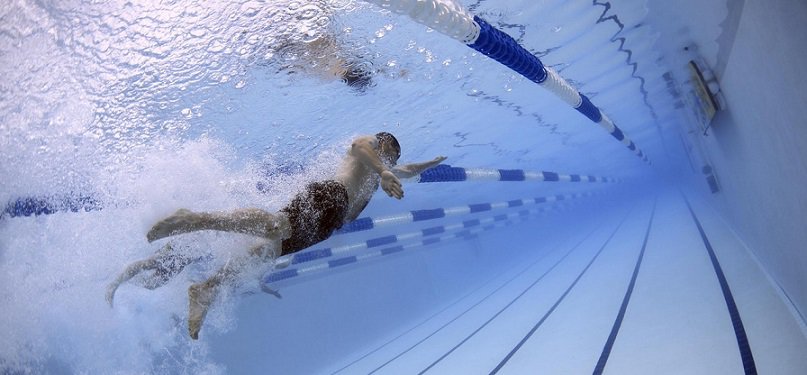
The result of all this motion was that both my kids were extremely slim. Our doctor often checked their weight and height and asked us to feed them an extra meal of oatmeal porridge or eggs before bed.
(In Sweden kids usually eat several times a day. They eat breakfast and get a snack at school before lunch. Then they get a snack either when they get home at 14:15 or at 15:00 if they go to an afterschool program. They eat supper and usually eat ‘Fika’ or another snack at 19:00!)
On top of all of that eating, we were to feed our kids again at 20:15!
Neither of my kids had extra fat which helps you float. My daughter who is even slimmer than my son has always been all muscles! There isn’t an ounce of fat on her even though she eats so much butter, cream, and pasta that I am constantly buying more!
Kids who have ADHD (whatever kind you have) often don’t have a lot of body fat. This can be due to extra motion or the fact that ADHD medication puts a damper on the body’s ability to feel hunger, so learning to swim correctly to be on a swim team can be harder for ADHD kids. On the other hand, once they do learn the correct swimming technique they often really enjoy swimming as a sport.
A swim team is a great option for ADHD kids because it’s a team sport that focuses on the individual. During a swimming competition, there aren’t a lot of distractions in the water, and swimmers don’t need to constantly check where their teammates are and reevaluate the game.
Even in swimming relays, ADHD kids know exactly where their teammates are and what is expected of them.
If your child enjoys water try to spend time swimming with them even if they are not interested in Swimming as a sport.
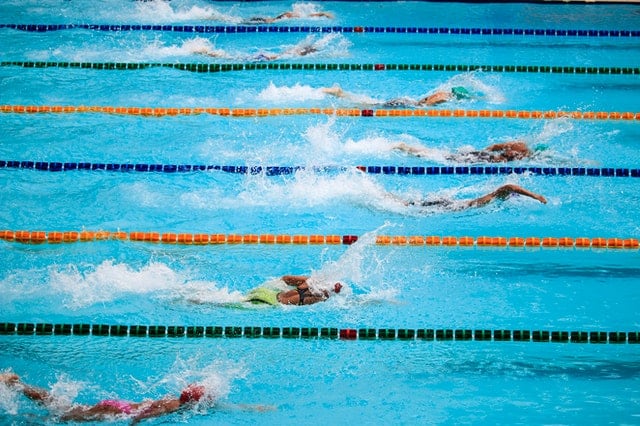
ADHD kids have a higher chance of drowning!
Don’t let your child swim alone! Keep your eyes on toddlers and grade school children at all times!
I have observed that kids with ADHD often seem to think they know how to do things when in reality they can’t! This seems to hold true for ADHD kids no matter what combination of symptoms they have!
When my daughter was four years old she thought she could swim. In reality, she couldn’t swim at all!
My husband took the kids to a small local indoor pool. The swimming lanes were about half the size of a regulation-sized pool for swimming competitions.
My husband was in the shallow end with my daughter when she climbed out of the pool. He thought she was going to jump to him like she had done many times before, so he didn’t follow her. Unfortunately, she had a different idea. She ran to the deep end and jumped in despite my husband yelling at her not to!
She sank to the bottom like a brick! My husband in his panic to get to her slammed his knee into something which greatly slowed his progress. About the time he realized he couldn’t get there in time another parent jumped in and saved her life!
My husband is a very good swimmer. He was in the Swedish Navy and still loves to swim. If it’s possible for one of his children to nearly drown in a tiny pool with him nearby then it can happen to anyone!
While researching for this article I came across several articles written by family members of ADHD children who drowned. They plead with parents of ADHD kids to put their children in swimming lessons and make sure ADHD kids know how to swim!
Many drownings happened during the teenage years to ADHD adolescents who didn’t properly learn how to swim!
Going to the swimming pool can be a great social experience for your child, it helps ADHD kids release energy, it improves motor skills and executive brain function, and it’s a great way for your child to get a full-body workout while having fun.
Famous Swimmers with ADHD
Michael Phelps. Has earned 28 Olympic medals (23 gold) and holds the record for winning the most Olympic events in History.
He believes that his ADHD has given him his drive to win.
Swimming was not love at first sight for Phelps at first he hated and struggled to learn the correct swimming techniques.
“Once I figured out how to swim, I felt so free.” He recalls, “I could go fast in the pool, it turned out, in part because being in the pool slowed down my mind. In the water, I felt, for the first time, in control.” he told Understood.org.
The Benefits of Swimming for ADHD kids
- Exercise improves brain activity and raises dopamine levels
- Water slows down the ADHD brain according to Michael Phelps
- In water kids with ADHD are forced to slow down their movements
- Most swimming classes set small attainable goals and only a few at a time (like learning the breaststroke) this keeps ADHD kids from getting overwhelmed.
- Swimming is a low impact sport it doesn’t strain your joints like many other sports. If your kids are like mine they are running around climbing everything and jumping whenever they can. (My ADHD and ADD child both do this even though my ADD child can sit still longer than my ADHD child; she still needs physical activity to provide more dopamine to the brain.) They strain their joints every day, so a sport like swimming can benefit them long term.
- Many kids with ADHD like water and playing at the pool even if they don’t want to join a swim team they can benefit from swimming as a form of play. Most kids burn off tons of excess energy in the pool and don’t even realize it!
(Source) https://www.tandfonline.com/doi/abs/10.1080/07303084.2016.1216486?src=recsys&journalCode=ujrd20
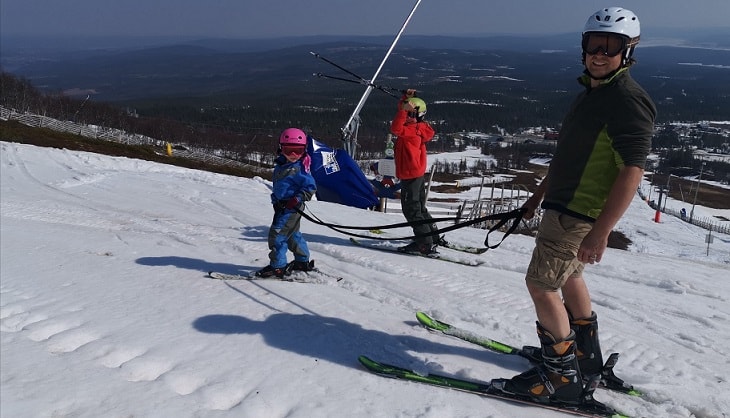
15) Downhill Skiing
We are privileged to live 15 minutes from a ski resort. All my kids love to ski. They have been skiing since they were old enough to stand on skis.
Skiing is a great sport for ADHD kids. Both my son who has ADHD predominately hyper and my daughter who has ADHD predominately inattentive love to ski.
At ski resorts, there are ski-school classes for kids if your children don’t yet know how to ski. It’s usually easier to enroll your child in a class than to try to teach them yourself.
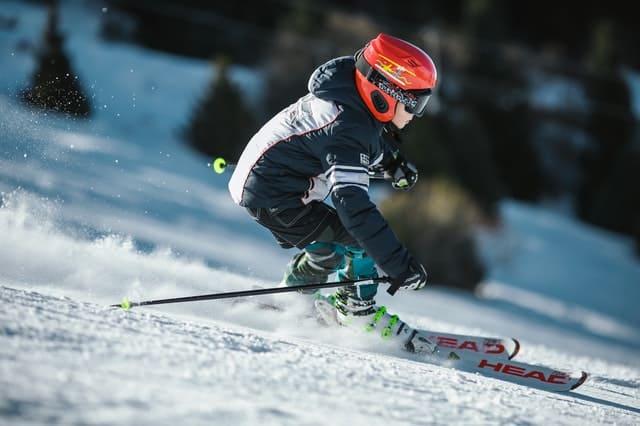
We tried both ways. We managed to teach our oldest son and daughter how to ski without any classes, but our youngest daughter was a handful and listened better to the instructor than to us. (She is extremely inflexible)
Our son (ADHD) learned to downhill ski like any normal kid. When he was five he could ski well by himself.
Our daughter (ADD) learned how to ski when she was three! After two and a half days of my standing at the bottom of the bunny slope and catching her when she couldn’t stop. She figured it out! At that point, she was more stable on her skis than her friends who were the same age or older.
Skiing is a great individual activity, but it’s social at the same time. My kids ski with friends or we spend time talking when my husband and I sit in the lift with them.
The great thing about skiing is that kids expend lots of energy, but they need to wait in the lift and that forces them to slow down. Therefore ADHD kids can ski for hours without tiring out and asking to go home.
Skiiers with ADHD
Hunter a middle schooler at Bridges Middle School in Portland Organ, is a competitive Ski Racer.
”My ADHD SuperPower: Hyper-Focusing in Competitive Ski Racing I am a ski racer.
I have been skiing since I was two. At first, the attention part of my ADHD was hard — if the coach was talking and I missed the information, I would have to do sit-ups to make up for it.
When I was younger, I complained. Now, I view it as a workout to help me ski better and I view it as a reason to listen.”
The Benefits of Skiing for ADHD kids
- Skiing improves coordination
- Kids learn to assess danger (Are they going too fast? Will they crash into a tree? How are the other skiers moving shouldn’t ski into anyone. Is it safe to ski on the other side of the ledge?)
- Skiing helps kids strengthen core muscles which help with side effects of ADHD like low tone and constipation. To get Wendy Hayden’s book click here What Your Doctor Didn’t Tell You About Childhood Constipation Audiobook
- Skiing encourages friendships. Skiing is social. It’s a good way to spend time with friends while getting rid of excess energy. ADHD kids are less likely to annoy their friends or talk too much when exerting tons of energy.
- Kids burn off extra energy.

16) Cross Country Skiing
My kids all learned to cross country ski before they tried downhill skiing.
They still enjoy cross country skiing. Usually, we ski shorter distances like 5 kilometers and often stop at a restaurant to buy waffles during our outings.
When my oldest started downhill skiing he complained for months that they didn’t have any waffles!
My daughter (ADD) always loved to ski! When she was 3 we put cross country skis on her for the first time. I sent her out to ‘TRY’ to ski while my husband and I helped our son put on his ski-boots. When he was finally ready to ski my daughter had disappeared!
We were temporarily panicked! Where could she have gone? We didn’t think she would be able to ski the very first time she tried!

We ran all over the yard and didn’t see her anywhere! Then to our surprise, she appeared skiing out of a deep ditch!
She apparently skied in the ditch which was deeper than she was tall and we couldn’t see her at all!
She could ski well on her first try without any lessons or instructions!
Many kids in Sweden enter cross country skiing competitions, and train every week!
Our family skis to spend time together, to get out in nature, and to have fun! Getting a workout is just a fun side effect.
Benefits of Cross Country Skiing for ADHD kids
- Kids burn off extra energy
- The movements of cross country skiing are similar to crawling which develops gross and fine motor skills, develops vision and brain functioning!
- Crawling or other similar movements like climbing a ladder or cross country skiing encourages the left and right sides of the brain to work together!
- It’s social! We love to talk and ski simultaneously
- Improves coordination

17) Cycling
My kids love to get on their bikes and bike up and down the hills around our house! Both my daughter who has ADHD inattentive (ADD) and my son who has ADHD predominately hyper love to bike!
Both kids burn off extra energy and take risks, like cycling downhill FAST, or they cycle the track through our Forrest hitting bumps in the trail as hard and fast as they can!
Many times I’ve heard exciting screeches while doing the dishes and stuck my head outside to see what all the excitement was all about. The fun on my children’s faces was often enough for me to swallow my mother’s instincts and choke back my desire to tell them to slow down!
At times I stood by the door screeching at the top of my lungs that they needed to stop and put their helmets on if they wanted to keep their bikes!
Cycling can be a form of transport as well as exercise for kids. My son who is 13 loves the independence his bike gives him. We don’t have a lot of stores in the vicinity that he can bike to, but he visits friends and relatives on his bike.
We live close to a ski resort which doubles as a downhill bike track in the summer. Last year my husband and son bought lift passes and cycled downhill. My son loved it!
This is an expensive sport if you must take a lift up to the top, but if you can find a downhill trail you can drive to it’s much cheaper.
Moderately steep downhill trails don’t require front and back shock absorbers and you can have fun on a much cheaper bike!

A few different kinds of bicycle Racing are:
- Road bicycle
- Track cycling
- Cyclo-cross
- Mountain bike
- BMX
- Cycle speedway
- Motor-paced racing
The Benefits of Cycling for ADHD Kids
- Cycling burns lots of energy
- Gives kids a sense of adventure
- It’s a social sport. My husband gets to spend quality time with our kids when biking
- Develops core muscles which help some of the side effects of ADHD like Low Tone and constipation. To get Wendy Hayden’s book click here What Your Doctor Didn’t Tell You About Childhood Constipation Audiobook
- Exercise improves executive brain functioning.
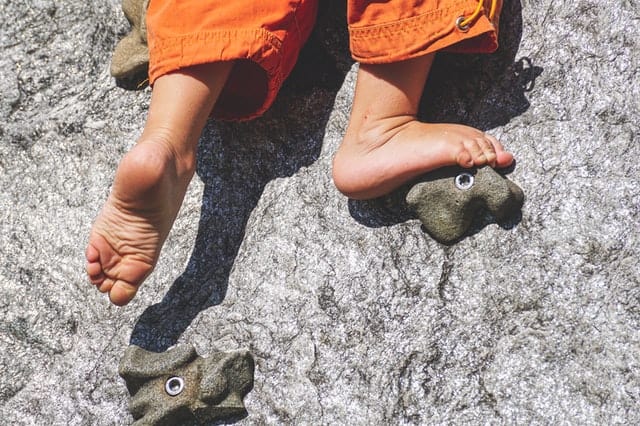
18) Climbing
Because my husband was obsessed with climbing during periods of his life it was natural for him to take our kids climbing as soon as they were old enough.
Both of my older children enjoy climbing. My six-year-old is still not interested in climbing on anything too high, but we have some fun family climbing outings anyway.
We climb mostly in nature because the nearest climbing gym is an hour away. That limits climbing to a warm-weather sport for us, but if you live in a warm climate or near a climbing gym you can climb all year round.
Some cities have climbing classes for kids, and at many climbing gyms, teenagers can climb without parental supervision. This can be a good option if your kids want to try climbing and you are not a climber yourself.
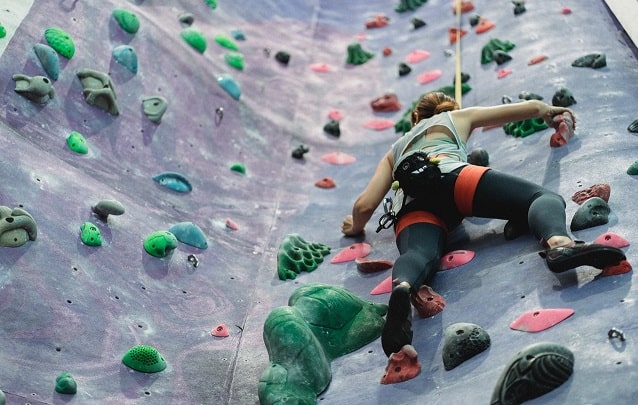
The Benefits of Climbing for ADHD Kids
- Climbing trains kids to concentrate
- Climbing helps kids challenge their fears
- It’s a sport that trains muscles that many other sports overlook thus a good sport to combine with other sports for the ultimate workout!
- It’s social most people climb in pairs
- It requires ADHD kids to calm down when they are high up and trying to find difficult grips

Conclusion
After reading several studies and checking recommendations from my children’s doctors it seems that everyone agrees that physical activity is extremely beneficial for ADHD kids.
It’s just as beneficial for ADHD predominately hyper as for ADHD predominately inattentive.
Every child with ADHD has a unique combination of symptoms and complications. There may be some trial and error in selecting a sport. My kids tried soccer (football) first because that is a really popular kids’ sport where we live, but it wasn’t a good fit for either of them.
My son tried hockey for 6 months, but he wouldn’t let us leave him at practice by himself. He eventually decided that Hockey was not for him.
Even though many recommend Hockey as a traditional team sport that suites some ADHD kids it doesn’t suit all ADHD kids no sport does.
I hope this post will help you think through the pros and cons of different sports and give you a better understanding of what sports your child should try.
My Post 13 Important Considerations When Your ADHD Child Picks a SPORT! may be helpful for you.
I originally wrote this post and the post 13 considerations… as one post, but it became too lengthy to publish together.
I gathered all of our favorite resources for ADHD and Dyslexia in one place, so check out Our Favorite Resources Page!
You can find some of my personal favorite posts on ADHD below
Why Working as a Team, to Parent Your ADHD, Child is Crucial!
15 Super Games for 10-99 Year Olds with ADHD/ADD and Dyslexia
